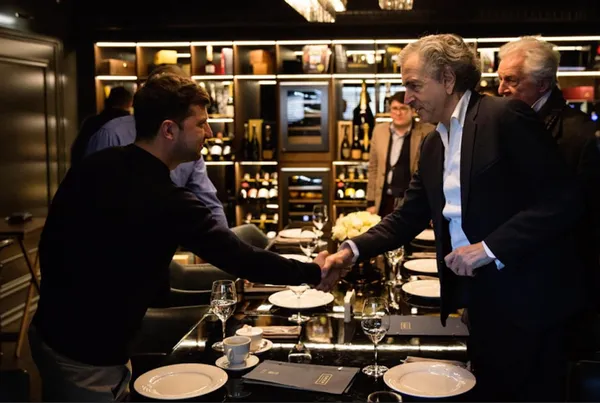 |
| Volodymyr Zelensky meets with Bernard-Henri Lévy just days before he is elected President of Ukraine Photo: Yann Revol, courtesy Cohen Media Group |
Bernard-Henri Lévy on Wednesday, April 20 moved up our scheduled time to meet from 3:00pm (New York time) to 2:30pm so he could watch from the start the final French presidential debate between Emmanuel Macron and Marine Le Pen. The election is today, Sunday April 24.
In The Will To See (Une Autre Idée Du Monde), co-directed with Marc Roussel, produced by Kristina Larsen (Benoît Jacquot’s Farewell, My Queen and Suzanna Andler, based on a Marguerite Duras play; Cédric Kahn’s Wild Life; Bertrand Bonello’s House Of Tolerance; Jean-Paul Salomé's Mama Weed), and executive produced by Emily Hamilton, Bernard-Henri Lévy takes us up close to many of the never-ending crises around the world.
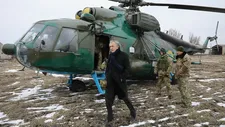 |
| Bernard-Henri Lévy: “I was in Ukraine a few days ago. Before that I was in the area of Odessa, Mykolaiv, I continue to go.” Photo: Cohen Media Group |
This must-see documentary, shot by Olivier Jacquin and Roussel is dedicated to Paris Match Managing Director Olivier Royant who initially commissioned the series of articles on the war zones. Yale University Press has published Lévy’s The Will To See: Dispatches From A World Of Misery And Hope.
The Will To See takes us to Ukraine, Afghanistan, Syrian and Iraqi Kurdistan, Somalia, Greece, Libya, Bangladesh, and Nigeria to shine a bright light on the personal stories of suffering, sacrifice, and perseverance.
From not in Paris, Bernard-Henri Lévy joined me on Zoom for an in-depth conversation on The Will To See and where we are today.
Anne-Katrin Titze: Where in the world are you at the moment?
Bernard-Henri Lévy: I’m not in Paris.
AKT: That’s a good answer. Let’s begin with the title of your very important film. It is perfect because it combines the necessary will with how much it is about seeing. If you see something it’s much harder to ignore.
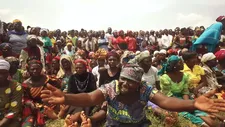 |
| Nigerian women asking for help in The Will to See Photo: Cohen Media Group |
BHL: You said it perfectly. The two words are there. One of the problems of the world today is that people don’t want to see, don’t have the will to see. They don’t just ignore, they don’t have the will and in a film like this, you know my documentaries, I, in fact, try to convince people, to engage people to have this will. Since my film [Bosna!] on Sarajevo nearly 30 years ago now.
AKT: This film begins really with the Nigerian woman whose arm was cut off. And you give us the sentence that she is no longer alive when we see the footage.
BHL: She died a few months after our meeting. I heard about her death at the beginning of the editing of the film and she was dead since a few weeks already in a new massacre, the same sort as the massacres that killed her husband and her children.
AKT: Cinema as haunting, it is the return of the story. The repetition of history that you point us to so many times. From the Greeks and Homer and Dante, as you say.
BHL: Absolutely.
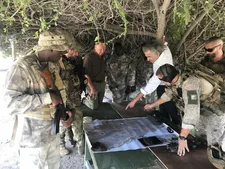 |
| Bernard-Henri Lévy in Somalia Photo: Cohen Media Group |
AKT: It’s never-ending.
BHL: First of all it’s never-ending, of course. But this is metaphysical. Another thing which is more concrete is that a lot of characters, a few characters of the movie died during the time I was completing the movie. I heard so many times during the shooting itself and during the editing that this person or that one just died.
And it’s very strange to make a movie under these circumstances - not knowing if you’re not going to hear soon after that someone you have interviewed, you have met went to die. It’s strange for a moviemaker, for a documentarian. It’s not so frequent, I think.
AKT: It has a different effect on the audience too, knowing this. On a different note, how much you are hands-on is shown in the fantastic moment in the camp where the boy translates for you. The boy whose parents joined ISIS. There is a moment when he hesitates, which comes when you say “I am Jewish.” It seems as if he doesn’t know the word at that moment.
BHL: He does not know the word or he does not want to pronounce it, I don’t know.
AKT: Yes, that’s exactly the question.
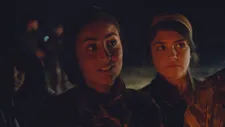 |
| Fighters of the Syrian Democratic Forces in Syrian Kurdistan Photo: Cohen Media Group |
BHL: Because on the spot I did not realize that. I understood it afterwards, when I de-rushed, when I looked again at my rushes, my images. My editor told me that. He does not dare to say Jew.
AKT: It’s very powerful and also right after that you take the boy’s name, he has a French passport. It’s clear that it’s about the individual. About who matters and who doesn’t matter to the world. Your film says people matter.
BHL: One of the most unfair and unjust differences between human beings is that some of them around us in the world where we are living have no faces, have no name, have no real identity. They die without any archive. When I do a film like this I try at least to provide to these human beings what they are not having, which is this name, this face, and when they die a place where they will be a little memorialised.
AKT: Remembered.
BHL: Remembered, yeah.
 |
| Bernard-Henri Lévy’s The Will To See: Dispatches From A World Of Misery And Hope (Yale University Press) Photo: Anne-Katrin Titze |
AKT: Which makes me think of something that also comes up in your film, the massacre of Babi Yar in Ukraine in 1941. It always struck me that we have this precise number of people killed, 33, 771. The one in the end points to the individual, that this is not abstract.
BHL: Yes.
AKT: Which brings us to Ukraine. When did you do the interview with Volodymyr Zelensky?
BHL: The interview with Zelensky was done two weeks before his victory. The day before the first round of the election. 2019, probably May, I think. The Saturday before the election.
AKT: And he says a sentence that again fits so well with your title: “I don’t like people without eyes.”
BHL: Exactly, you got it. Thank you for noticing that.
AKT: Are you going to Ukraine again now?
BHL: Yeah, I was in Ukraine a few days ago. I will have a reportage from Ukraine. It is already produced in France today and it will be in Tablet Magazine, I think in the next days also. I’m just back from Ukraine. Before that I was in the area of Odessa, Mykolaiv, I continue to go.
AKT: Already in your film there is a mention of Mariupol and the seaside resort that had been bombed even then, with no military target in sight. And to see the destruction now is so terrible.
BHL: I am probably one of the last Westerners who got images of Mariupol brilliant, alive, a great city. And this is a big sorrow when I think about it. In the film there are the very places in Donbas which are threatened now and hit by Putin. When I read the news today, I know exactly where it is. I know exactly where it is and I probably know the people who are under the bombs.
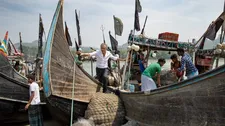 |
| Bernard-Henri Lévy in Bangladesh Photo: Cohen Media Group |
AKT: The refugee camp on Lesbos is another very strong moment. You compare it to “the little princess Europa” and point out that there is no safety for the girls there. Have you been back there since?
BHL: Not since, but for the film I made two different stays. One in February or March 2020 and the second one in June probably. I had to do it twice to catch the essence of the scandal which is happening there. I had to come twice.
This is strange, in all the sequences of this film, the only one which required from me to come back is the one about Lesbos. Of course I went very often to Libya, I went on and on to Kurdistan, but not for the film. For the film I felt the urgent need of going twice to be sure that I saw what I saw.
AKT: I have to ask you a question about your clothes. Because I think it’s very important what you decide to wear. You don’t blend in ever. The white shirt, the suits, it feels that your “strangeness” in these circumstances helps, aids in the telling of these stories to the world. Can you tell me about your sartorial choices?
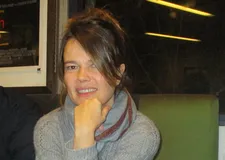 |
| The Will To See producer Kristina Larsen Photo: Anne-Katrin Titze |
BHL: First of all, what you said, yes, I don’t want to pretend that I am what I am not. I am a stranger. I come from outside. I will go away and they will stay, this is clear. I cannot pretend the opposite. This is the first thing. Number two, it’s a way of expressing my respect.
I’m not going to disguise myself when I go on such a reportage. I’m not going to be a fake myself. I go as I am. As I am most of the times of my life, not today [he is in a black T-shirt for our conversation]; it’s an exception. When I go to Lesbos or Misrata, I try to be exactly who I am and how I am. Respect.
AKT: Respect - that makes perfect sense. You studied with Jacques Derrida and Derrida has been on my mind watching all the reports from Ukraine. What he said about forgiveness and that the only thing worth forgiving is the unforgivable.
BHL: It’s right, but the forgiveness has to be asked and begged for by the guilty one. It is true, the only thing you have to forgive is the unforgivable, it’s even in evidence. But there is one condition that is very important, that those who commit the fault, the crime, beg for forgiveness. Not only ask, but ask and ask and beg and finally, maybe the one who received the wound is the only one who can forgive.
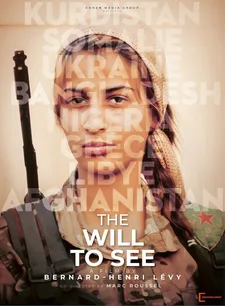 |
| The Will To See poster |
AKT: Do you feel any connection to this?
BHL: No, because I don’t belong to a family of victims, I belong to a family of … My father was not a victim of the Holocaust, he was a fighter against Nazism, a French freedom fighter. I never felt in my flesh the necessity or the impossibility of forgiving. Of course I thought a lot about it. I wrote philosophical essays but it’s not a question of myself.
AKT: The second round of elections is coming up in France [on Sunday, April 24]. What do you think, what are you feeling?
BHL: I will have a more precise idea in exactly eight minutes. Because there is a big debate between Le Pen and Macron.
AKT: Ah, that’s why our conversation was moved up half an hour?
BHL: Exactly. But I’m convinced that the French people will not commit this crime against themselves to vote for Le Pen. It seems to me impossible.
AKT: You were right in your predictions often, I very much hope you are right again. You dedicated the film to Olivier Royant, the Paris Match Managing Director. He was the one who started the project!
BHL: Yes, he was the one who came to me. As you know, I’m not a journalist by profession. I do some journalism from time to time, I’m a philosopher/writer. And he commissioned me, he engaged me, he hired me as a reporter for Paris Match. And when he came to me I told him “You are a better journalist than I am. I’m not sure that I am young enough to do such an amount, such a quantity of reporting.”
And he told me, yes, please go! He encouraged me and he is one of those who died in the process, as you understood in the film. He died of cancer just after the shooting was finished. He wanted this series of articles, therefore he wished this film. He was aware during all his illness that the film was in process. He followed till the last breath. This is great journalism, by the way, he followed the process of the film till two weeks before he died. And he died strangely enough when the film was over.
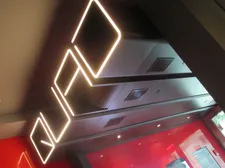 |
| The Will To See opens at the Quad Cinema in New York on April 29 Photo: Anne-Katrin Titze |
AKT: Kristina Larsen was your producer, I met her a few times. Did you have a team that followed you throughout the entire process? Can you tell me about them?
BHL: Of course I had first a co-director, Marc Roussel, who is a very brave and brilliant photographer basically. And he became a film director with me on a film we did eleven years ago. And Gilles Hertzog, who is an old companion of mine since we wrote about the Portuguese revolution in 1974 already.
And a young man, Olivier Jacquin, who is a very brave cameraman. And about the team the one who was really at our side, Marc Roussel and myself, during the whole process is an American lady, she was the executive producer under Kristina Larsen, Emily Hamilton. She was absolutely key in the process of the filmmaking.
AKT: And she is the one who arranged our conversation today! Thank you for an important film! And watch the presidential debate! I will too.
BHL: Thank you, thank you so much! Bye bye!
The Will To See opens at the Quad Cinema in New York on Friday, April 29. On April 29 at 7:00pm, Bernard-Henri Lévy will introduce the film and participate in a post-screening Q&A.





















